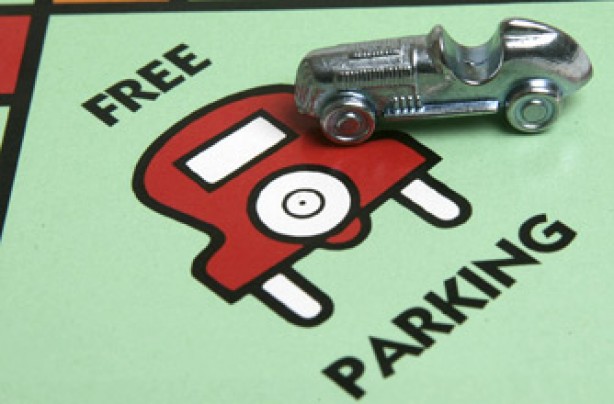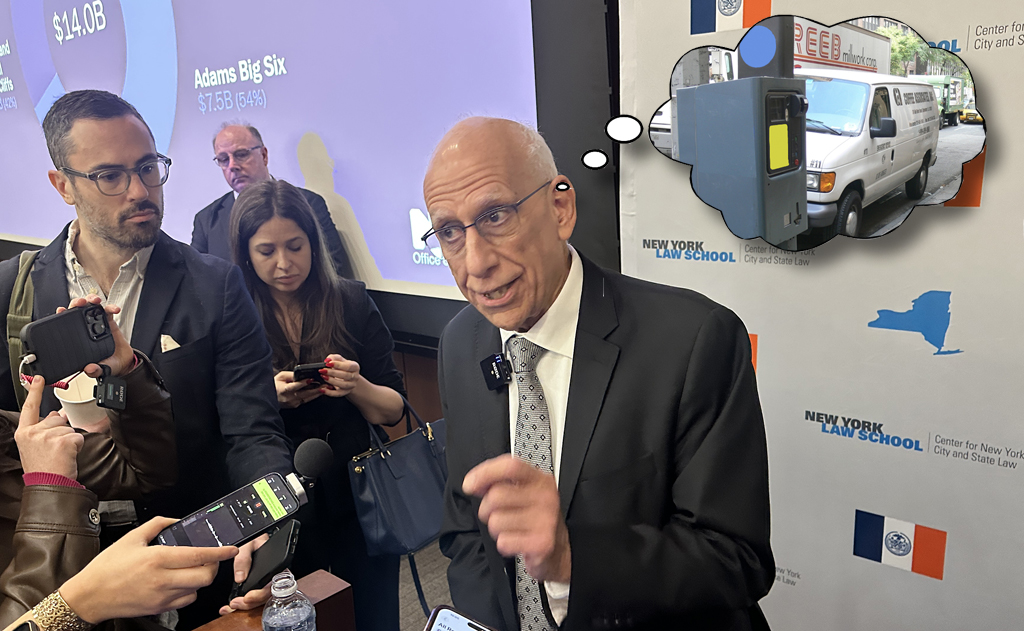Members of a Manhattan community board want the mayor to stop giving away the "precious resource" of free on-street car storage and consider how the city's limited curbside space can best serve the vast majority of area residents who do not own cars.
As Manhattan CB 7's transportation committee sees it, the very presence free on-street parking on the Upper West Side only serves to exacerbate congestion. On Tuesday, the panel demanded an end to it entirely.
"The city's current policy of allowing the vast majority of street space adjacent to curbs to be used for free parking needs to be revisited regardless of this effect of congestion pricing," the ground-breaking resolution reads. "This huge amount of city-owned land is a precious resource in a city as dense as New York and, as with all city resources, should be used in a manner that helps those in need and/or creates the greatest good for the greatest number of people."
Research shows that free on-street parking encourages people to drive. But there's only a finite amount of on-street parking to go around, so drivers inevitably end up cruising block after block looking for somewhere in the public right of way to store their private vehicles, worsening the city's soul-crushing congestion.
Upper West Siders worry that problem will be exascerbated after congestion pricing launches below 61st Street in 2021.
"We already have a nightmare on our streets, and it’s only going to get worse," transportation committee co-chair Howard Yaruss told Streetsblog. "We have problems on our streets with double parking, people cruising for parking. This is going to get 10 times worse when congestion pricing starts."
Among the possible alternatives CB 7 suggests: paid residential parking permits and dynamic parking meter prices that reflect demand, something DOT has started to do in parts of Manhattan.
Residential parking permits have been on and off the citywide policy agenda for years — consistently opposed by city officials. Local council members Mark Levine and Helen Rosenthal have a bill that would create a permit system in Manhattan above 60th Street.
Time and time again, the city comes up with plans to redesign streets for safety — with bike lanes or sidewalk extensions, for example. And time and and time again, community board transportation committees hack away at those plans to preserve as many free on-street parking spots as they can.
In the last year, Manhattan CB 7 has flipped that script. Under previous co-chair Dan Zweig, the committee held up protected bike lane redesigns on Amsterdam and Columbus avenues for years, forcing the city come back month after month with tweaks to its live-saving plans.
But under the leadership of Yaruss and longtime co-chairman Andrew Albert, the committee has pushed DOT to install protected bike lanes on 110th Street and Central Park West, and taken a strong stance against on-street parking — and not just this month. The committee has also pushed for more delivery and loading zones.
Tuesday's resolution still needs approval from the full board, which meets on June 4 at Congregation Rodeph Sholom. Yaruss said his case to the board will be similar to the case for protected bike lanes three years ago: The cars, like the bikes, are coming, regardless of what the community board says or does; it's on policymakers to prepare for their arrival.
"It’s a vote not for a bike lane. It’s a vote against chaos," he said. "We can’t just put our heads in the sand."
Here is the full — unofficial — text of the committee's resolution, as read by Yaruss at Tuesday's meeting:
A congestion pricing plan was passed by the state government which will impose fees on cars that travel south of 60th Street. The committee is concerned that this will cause an increase in the number of non-residents looking for parking on streets just north of this border, so that they can park for free and then take public transportation into the congestion zone. This will cause an increase in people "cruising" the neighborhood looking for parking (already a significant problem).
Additionally, the committee believes that the city's current policy of allowing the vast majority of street space adjacent to curbs to be used for free parking needs to be revisited regardless of this effect of Congestion Pricing. This huge amount of city-owned land is a precious resource in a city as dense as New York and, as with all city resources, should be used in a manner that helps those in need and/or creates the greatest good for the greatest number of people.
Free parking for private cars strongly encourages private car use over mass transit, thereby creating traffic congestion, pollution, environmental degradation and unsafe conditions for pedestrians, cyclists and other users of the street. It also exacerbates economic inequality by directing limited city resources to private car owners (a group of people more economically privileged than non-car owners) rather than to New Yorkers in general or to New Yorkers who are disadvantaged either economically or physically.
Therefore, the committee resolves that the city discontinue the policy of providing free parking for private cars and consider (1) more productive and equitable uses of curbside space and (2) the most efficient way to get fair value for the provision of any private parking it does provide. The committee specifically recommends that the city's review of this policy include, but not necessarily be limited to, paid residential parking permits, metering capable of surge pricing and the best practices of other major cities.






